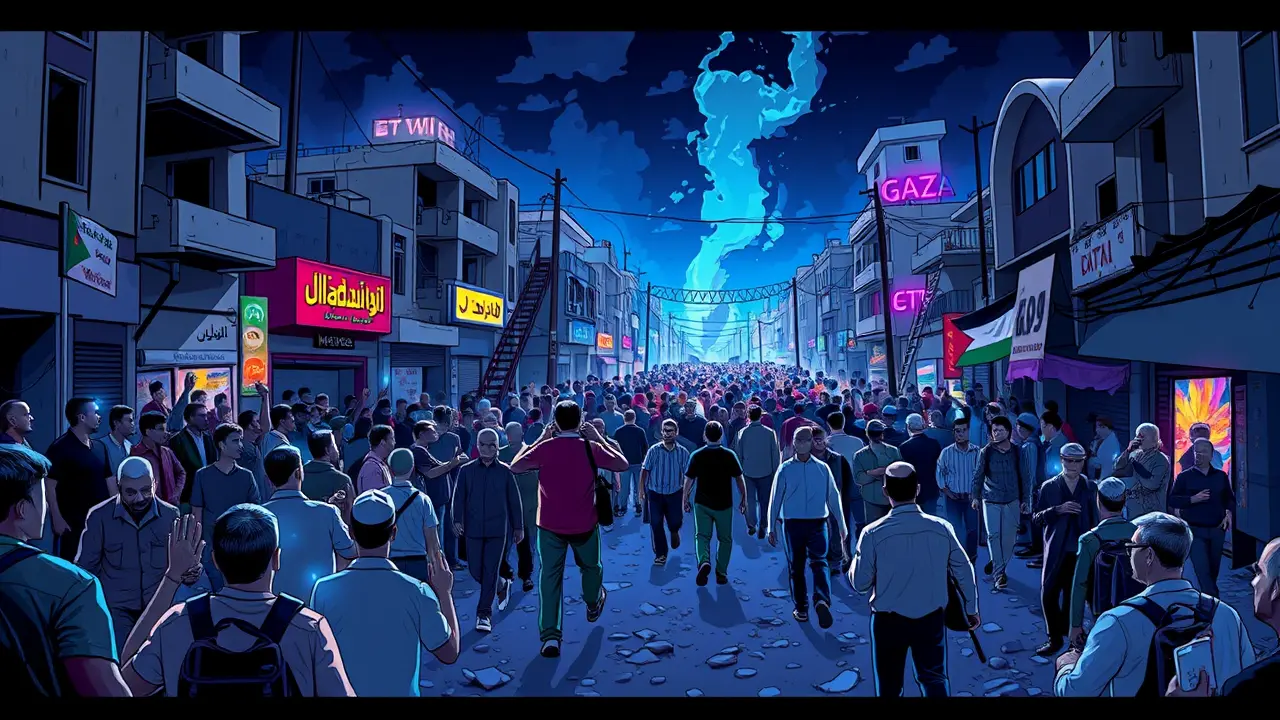Palestinians celebrate Gaza peace deal announcement.
The streets of Khan Younis, a city whose name has become synonymous with the very anatomy of conflict, erupted in a raw, unscripted symphony of relief. This was not the cautious optimism of diplomatic corridors; this was the visceral, human sound of a people breathing, for the first time in what felt like an eternity, a different kind of air.The announcement of the first phase of a Gaza peace deal did not just land as a headline on a news ticker; it detonated as a shockwave of possibility through the dust-choked alleyways and shattered squares. I read the Reuters alert on my phone, the stark letters feeling almost inadequate to contain the seismic shift they represented, and immediately the images began flooding in—not from wire services, but from the phones of those on the ground, shaky, emotional, and profoundly real.Young men, who had known little but the percussive rhythm of war, clambered onto the skeletons of buildings, their voices hoarse as they chanted not in anger, but in a fragile, defiant hope. Fathers held children on their shoulders, not to shield them from falling debris, but to let them see a crowd that was celebrating, not fleeing.The scent of gunpowder, a permanent fixture in the olfactory memory of this place, was, for a moment, challenged by the simple, profound smell of bread being shared in the open. To understand the weight of this moment is to first comprehend the depth of the abyss from which it climbs.The Gaza Strip, a sliver of land holding over two million souls, has been a crucible of human suffering, a place where the geopolitical is intensely, tragically personal. The recent conflict was merely the latest, most violent chapter in a long history of blockade, economic strangulation, and a generational trauma that has shaped every aspect of life.The ceasefire negotiations, conducted in distant capitals like Cairo and Doha, have been a rollercoaster of raised and dashed hopes, each collapse met with a fresh wave of devastation. This particular breakthrough, therefore, is not merely a pause; for those in Khan Younis, it is a lifeline.It means the possibility of retrieving the dead from under the rubble for a proper burial. It means the first, tentative deliveries of food that isn't from a can, and medicine that can treat chronic illnesses rather than just shrapnel wounds.It means the chance to look at the sky without calculating the trajectory of incoming fire. The details of the agreement, as they trickle out, suggest a phased approach: a 72-hour halt in hostilities to allow for the entry of a significant convoy of humanitarian aid, including the fuel required to power generators in hospitals that have been operating in the dark.This is followed by a conditional cessation, the duration of which hinges on the success of parallel talks for a prisoner and hostage exchange—perhaps the most emotionally charged element of the entire process. The faces of the families of those held, both Palestinian and Israeli, are a stark reminder that this diplomatic document is, at its heart, about the fates of individual human beings.The celebrations, while cathartic, are tempered by a weary pragmatism. I spoke to an emergency medic, his face etched with exhaustion, who described the scene not as a victory party, but as a collective exhale.'We are not naive,' he said, his voice cracking. 'We know this is fragile.We know the tanks are still at the edge of the city. But for tonight, we can sleep without our boots on.For tonight, we are not counting the dead. ' This sentiment echoes through the community.The trauma is too deep, the scars too fresh, for unbridled jubilation. There is a palpable fear that this is merely an intermission, that the underlying issues—the crippling blockade, the political divisions, the fundamental questions of statehood and security—remain entirely unresolved.The challenge now moves from the battlefield to the negotiating table, a terrain often just as treacherous. Can this temporary calm be leveraged into something sustainable? Will the international community, which has so often stood by with hand-wringing rhetoric, now exert the sustained pressure and provide the necessary guarantees to build a lasting peace? The images from Khan Younis are a powerful testament to the universal human yearning for safety and normalcy.They are a plea, written in the smiles of children and the tears of elders, that this flicker of light not be extinguished. The road ahead is unimaginably long, littered with the wreckage of failed agreements and broken promises. But for the first time in a long time, on the streets of a broken city, there is a road, not just rubble.
CA
CautiousObserver11 hours ago
that's a powerful description of the relief there, and i see your point about it being a collective exhale rather than a victory party. i'd just add that the real test is whether this flicker of hope can be sustained beyond the initial 72 hours, given the history of broken promises.
0
© 2025 Outpoll Service LTD. All rights reserved.
